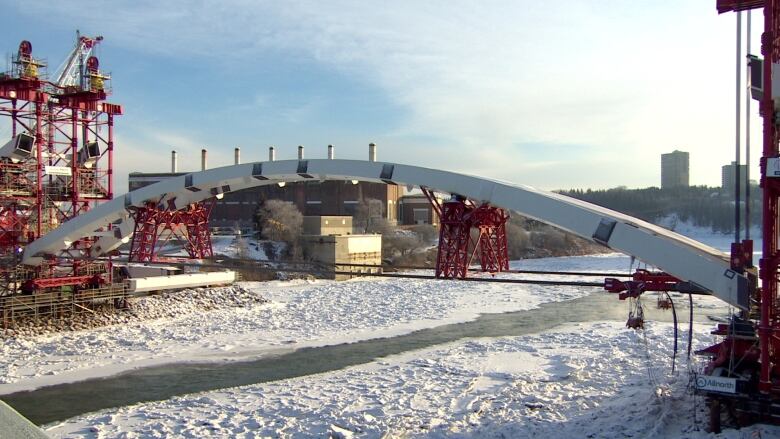Walterdale Bridge compromised by substandard work and materials, lawsuit alleges
Subcontractor Capitol Steel claims deficiencies will require costly repairs

The company under a contract with the City of Edmonton to replace the Walterdale Bridge has used substandard work and materials in its construction, resulting in deficiencies that will compromise the bridge's lifespan and strength and require costly repairs, a lawsuit claims.
In its statement of claim, subcontractor Capitol Steel Corporation alleges negligence by the city's contractor, Acciona/Pacer Joint Venture (APJV), that is due to an attempt by APJV to make up time on the bridge's construction, which is a year behind schedule.
"The demands by APJV to implement improper, substandard and deficient repair procedures (or no repairs at all) were intended to and would result in the acceleration of the completion of the project, but at significant detriment to the strength and long-term viability of the structure," the lawsuit claims.
APJV has countersued, claiming Capitol Steel breached its subcontract, which forced APJV to incur additional costs to hire a replacement subcontractor after Capitol Steel stopped work for alleged non-payment.
The new bridge over the North Saskatchewan River was scheduled to be completed by the fall of 2015. Although it is behind schedule, the city has stated it is still within its $155-million budget.
APJV opted to have the bridge's unique steel arches constructed in South Korea and then shipped in pieces for final assembly in Edmonton. But the steel arrived in Edmonton more than a year late, the lawsuit alleges.
The lawsuit claims that although both APJV and the city had inspectors on site in South Korea, the bridge arches arrived with many serious fabrication and welding deficiencies.
Deficiencies not properly repaired
With APJV being fined $10,000 for each day past deadline under the terms of its contract with the city, Capitol Steel claims APJV tried to cut costs and speed the project by not properly fixing deficiencies.
Capitol Steel claims it repeatedly identified deficient welds on the bridge that did not meet Canadian standards. But it said APJV balked at the cost of properly repairing the welds.
Unable to resolve their differences over how to repair welding deficiencies and other issues, APJV hired a new contractor to repair the steel fabrication issues and take over the welding from Capitol Steel.
But Capitol Steel claims the repairs conducted by the new subcontractor were substandard and APJV allowed it.
The allegations of substandard work include:
- welds performed without approved procedure in direct violation of Canadian welding and bridge construction codes and standards to which the project is subject;
- welding over defective welds, weld preparations and base materials;
- performance of weld repairs that do not comply with Canadian welding and bridge construction codes and standards;
- approval by APJV of substandard and deficient weld repairs;
- the delivery of additional structural steel with weld and fabrication defects and significant coating damage.
"The continuing work deficiencies will compromise the strength of the structure and will result in premature failures of welds necessitating extensive repairs," the lawsuit claims.
"After erection of the structure, the cost to repair such weld failures will be significantly more expensive and time-consuming than would be the cost and time required to perform proper weld repairs prior to erection."
City not warned of deficiencies
Capitol Steel claims it regularly notified APJV of the ongoing deficiencies. But,it says, "APJV has refused to investigate such continuing work deficiencies, has rejected all such notices from (Capitol Steel) without reason or justification and has failed to implement any repairs or corrections of the continuing work deficiencies."
The subcontractor claims it could not warn city officials about any of these problems.
"(Capitol Steel) has been unable to notify the City of Edmonton about these defects as APJV has alleged that any communication by (Capitol Steel) to the City of Edmonton constitutes a breach of the subcontract," the lawsuit states.
Capitol Steel filed its statement of claim in December 2015 and amended it on March 10. The lawsuit also alleges APJV has failed to pay Capitol Steel more than $12.5 million it owes for various work projects.
Allegations denied
In a statement of defence, APJV denies the allegations that it allowed and approved deficient steel fabrication and welding.
In its defence, APJV claims Capitol Steel "repeatedly altered the repair procedures to increase cost and slow (Capitol Steel's) proper completion of the repair work."
APJV denies it demanded substandard procedures and it says all welding has been carried out in accordance with the project's specifications and standards.
It claims Capitol Steel breached its contract by failing to correct defective work it produced.
It also accuses Capitol Steel of missing its construction deadline. It claims Capitol Steel was obligated to assemble the bridge's arches in three months, but it says nine months have passed and Capitol Steel still has not completed the work.
APJV says it has paid Capitol Steel for all work performed. It is countersuing Capitol Steel and is seeking $16.7 million in damages for breaching its subcontract.
None of the allegations in any of the court documents has been proven in court.












_(720p).jpg)


 OFFICIAL HD MUSIC VIDEO.jpg)
.jpg)



























































































